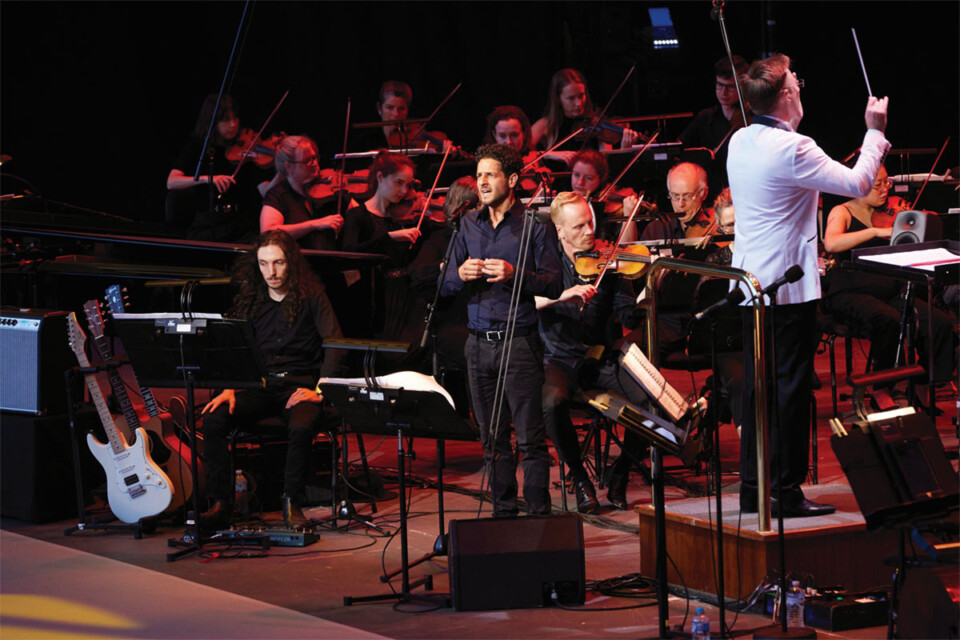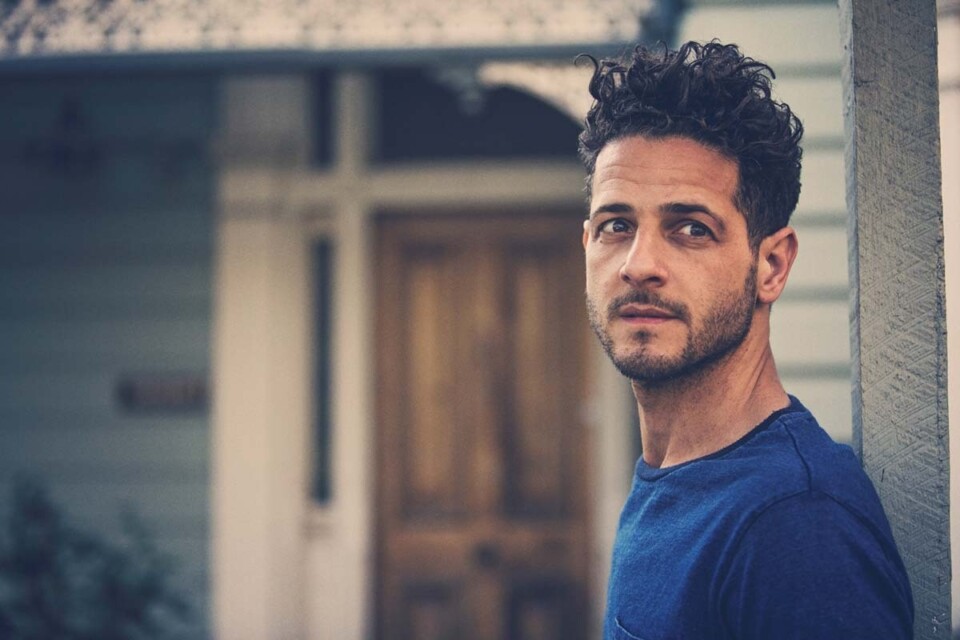Following the tragic death of his son, composer Nigel Westlake collaborated with singer-songwriter Lior to create the beautiful seven-movement work that is Compassion. Ahead of his performance with the MSO, Elissa Blake spoke with the cycle's creators.
It’s no small consolation to composer Nigel Westlake that a work written in the wake of the death of his young son has itself gone on to have a long and meaningful life.
Written with singer-songwriter Lior, Westlake’s seven-movement song cycle Compassion would not have existed had its creators not been brought together by the tragedy that struck the Westlake family in 2008 when Eli Westlake, then 21, was deliberately run down and killed by a drunk driver in what the sentencing judge later described as “a senseless act of anger”.
“Meeting Lior and working with him was the guiding force of my life at that time,” says Westlake. “I found a kindred musical spirit. Looking back at it all now, it was a blessing.”
Westlake and Lior met at a fundraising event for the charitable foundation Westlake created in Eli’s memory. Prior to that, Westlake had only been familiar with Lior’s work via his son’s CD collection; Lior’s 2004 album Autumn Flow was on high rotation.
“Eli was really into hip-hop at the time, but Autumn Flow was the last piece of music he and I listened to together. I think that underscored the incredibly strong connection I felt when I heard Lior sing that day,” Westlake says.
“He did some beautiful songs with his guitar and, at the end of the fundraiser, as an encore, sang a solo vocal piece called Avinu Malkeinu, an ancient Jewish hymn. I’d never heard it before, but hearing Lior sing it … it was like it was calling to me. I went up to him after the show and asked him if he would mind me recording the song and setting it to music – a symphonic arrangement.”
The two musicians began to exchange musical ideas. Initially, Westlake envisaged a short work, “something that might be performed at a festival as part of a bigger show”. Eventually, they created Compassion, a song cycle for solo voice and full orchestra using ancient Hebrew and Arabic texts. It was a far more ambitious project and one that would bring new perspectives on philosophy, music and collaboration – as well as new audiences – to each.
“We both knew that if it was going to work, we would have to be as open as possible and to focus on our strengths: mine in melody and lyrics, Nigel’s in arrangement and orchestration”
The idea of working with Westlake was “a bit intimidating at first”, says Lior.
“Nigel is steeped in the classical world and I’m very much grounded in contemporary music,” he says. “I studied classical guitar and my dad is a great classical music lover, but my main interest was always in songwriting. My mum’s a real folkie and the music of the 1960s and ’70s was what I naturally gravitated to. So, yeah, I felt a bit out of my depth working with someone like Nigel.
“But right away, we set out a mode of communication that was all about honesty. We both knew that if it was going to work, we would have to be as open as possible and to focus on our strengths: mine in melody and lyrics, Nigel’s in arrangement and orchestration.”
Working with a musician from the contemporary music scene proved easier than Westlake imagined. “It was like we were on the same wavelength,” he says. “We seemed to know at the same time what was or wasn’t working. I had no idea that could happen between musicians from such different disciplines.”
Westlake is Sydney-based. Lior lives in Melbourne. They began by sharing notes and ideas via email, prompted by Lior’s deep dive into the religious and philosophical texts of the Eastern Mediterranean and Middle East.
“It was important to me not to make the work culturally specific,” Lior says. “I knew a lot of the Jewish writings [Lior was born in Israel and lived there until he was 10], but what inspired me most was finding complementary texts from the Arabic tradition.
“I got in touch with my good friend Waleed Aly [best known for Network Ten’s The Project] and he helped put me in touch with experts and academics. I read lots of proverbs, poems and the hadith, the sayings of the Prophet Muhammad. So many of them had similar messages to the Jewish ones I’d grown up with.”
Lior also contributed melodic lines, mostly composed while he was out walking his dog. “I didn’t have a home studio set up so mostly I would sing lines into my phone while I was walking along. People must have thought I was mad.”
Those fragments of poetry and melody were like “precious jewels”, says Westlake. “The texts he found are great teachings, pinnacles of philosophy. Each has a great lesson to impart about humanity and how we can better relate to each other.”

Still grieving the loss of his son, Westlake found consolation as well as inspiration in the texts Lior provided. “There is one line that kind of said it all,” Westlake remembers. “‘Instil me with a sense of compassion so that I can be liberated.’ What a beautiful idea; becoming a more free person because you become a more compassionate person. Even before I knew what the piece would be, that was the key message I wanted to transmit.”
Another inspiration for Lior was Alain de Botton’s book Religion for Atheists. “I didn’t want to step into a position where I could be seen as transmitting a religious point of view,” he explains. “My interest was more in the cultural side of things and reading de Botton was important because he writes about his realisation that in rejecting religion, he was also rejecting so much of what is beautiful in philosophy and art. So, for me, this piece became about taking that kind of beauty into a secular space.”
Lior’s research seemed to feed into his music, Westlake says. “I felt that Lior was trying to extend his range and bring a sense of magic to the texts he discovered. I found that very inspiring. And I pushed him a bit, too, I admit. Initially he was adamant that he didn’t want to sing in Arabic and that we’d get someone else in to do it – and I kind of talked him around on that.”
Even though Lior’s grandfather taught Arabic and his father was born in Iraq and spoke the language while growing up, Lior says he “felt like an imposter” when singing it. “But Nigel wasn’t going to move on that. He didn’t talk me around. He just told me to do it!”
“We’ve been astounded by the response it gets. I’ve lost count of how many people come up to us afterwards with tears in their eyes”
Compassion premiered in 2013 at the Sydney Opera House to rapturous reviews. Recorded with the Sydney Symphony Orchestra and released as a CD, it won the ARIA award for Best Classical Album in 2014. The song cycle has gone on to be heard in festivals and concert halls across Australia.
Melbourne audiences first heard Compassion at the Sidney Myer Music Bowl in 2014 but Westlake is very much looking forward to presenting the work in a more acoustically sympathetic environment with the MSO. “The Sidney Myer Music Bowl was great – we had something like 10,000 people there – but in the Concert Hall, you’ll be able to hear all the resonances, the full power of the Orchestra and all the intricacies in Lior’s voice,” Westlake says.
“Everywhere it plays, we’ve been astounded by the response it gets. It’s an emotional experience that seems to bring great joy to people. I’ve lost count of how many people come up to us afterwards with tears in their eyes."


A Night of Compassion, featuring Lior and special guests, was performed 29 September 2022 at Melbourne Town Hall.
Presented in association with the Festival of Jewish Arts and Music.
